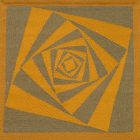two dice is the way it used to be.
A little while ago Nicola Morgan (author of the excellent "Teenage Guide to.." series) was asking what people now use. Do they still use "die" for the singular?
I remember the Senior Cat teaching me about "die" and "dice" when I was a mere kitten. I had barely started school but I was all too ready to argue with my teacher if I wanted to write something. My paternal grandfather had helped me make a game with a chess board, some counters and a die. The Senior Cat told me about "die" and "dice". I went off to school all ready to show the class for my "morning talk" and tell them about "die" and "dice". My teacher was not impressed. She told me "nobody is dying" and that the word was "dice".
Who was I to believe? The Senior Cat was teaching in the same school at the time and I know he informed the teacher. He probably did so in as diplomatic a fashion as he could but it did not make him or me very popular. My teacher did not apologise. She left a class of children believing that both the singular and the plural just happened to be the same.
Perhaps she could see into the future because the trend is now definitely in the direction of that one word for both the singular and the plural - dice. My niece and nephews all say "dice". Their children say "dice". Other children I know say "dice". When being a "magician" at birthday parties the Senior Cat would tell the children about this. I don't know how he did it but I know the idea stayed in the minds of at least some children.
And that die/dice pairing is just one irregular plural in English. I won't get started on "foot" and "feet", "mouse" and "mice", and "goose" and "geese". But "fish" and "sheep" and then "man" and "men", "woman" and "women", "child" and "children? Please!
I am not sure that collective nouns are any better. It might be better not to mention them at all - apart from "a luck of dice" and a "comfort/destruction/glaring/kindle/litter/pounce" of cats.
Would it just be easier to "herd cats"?



